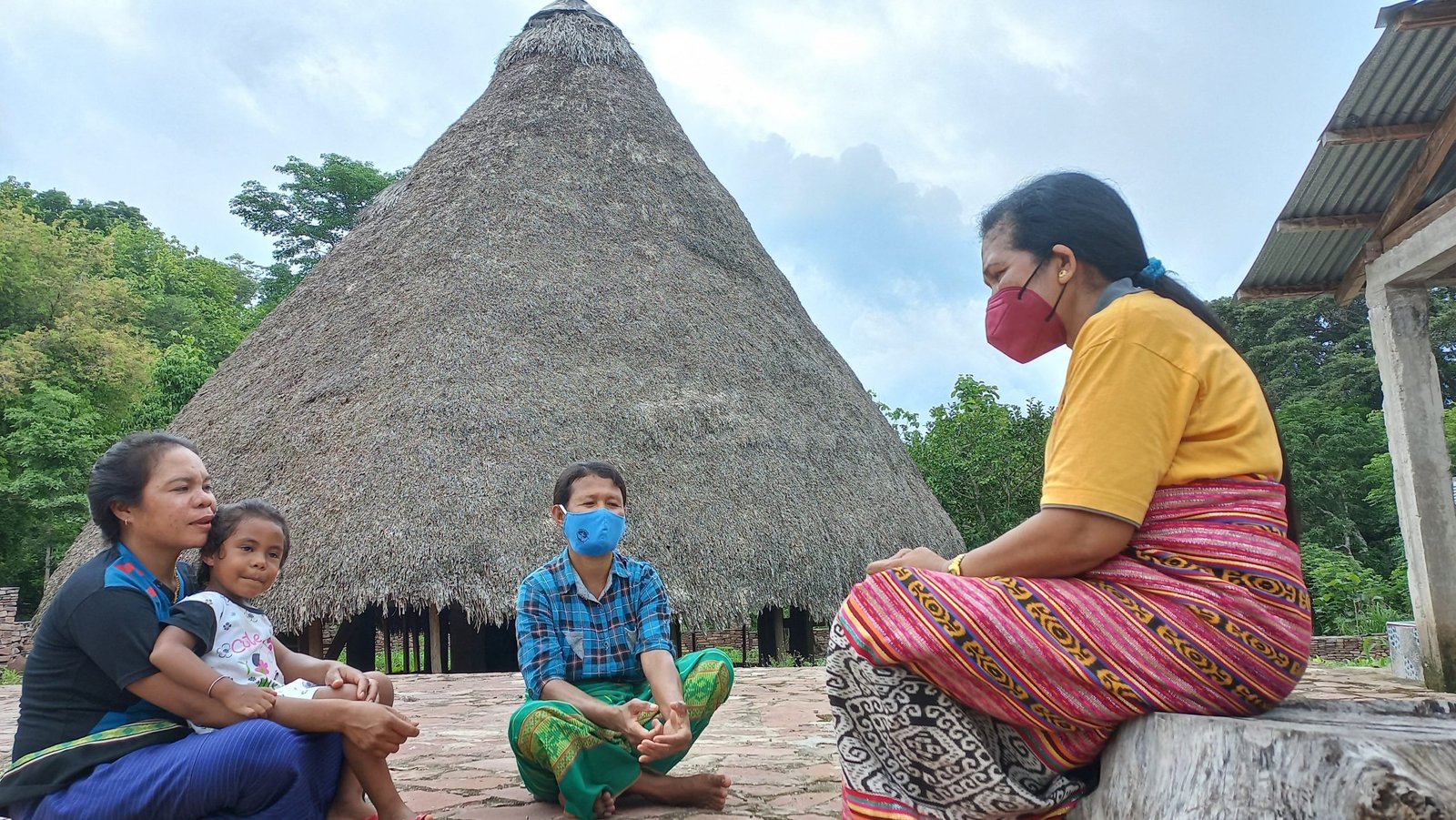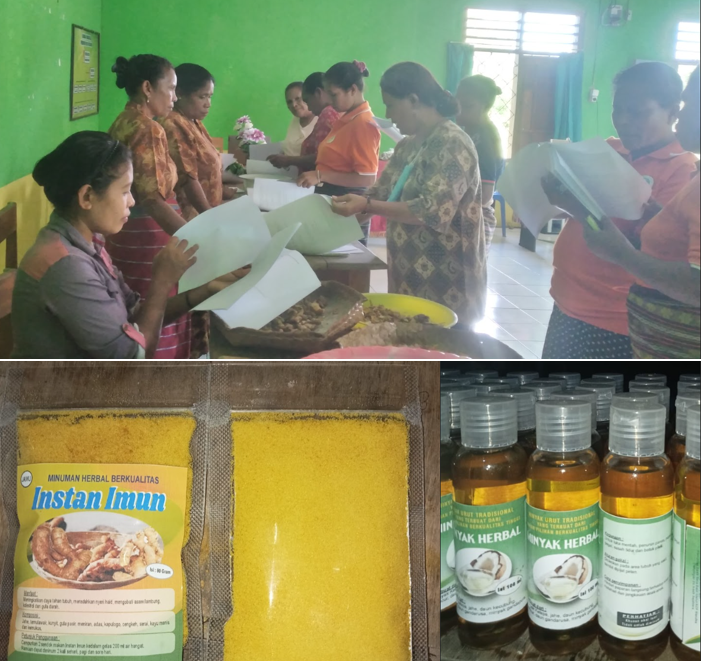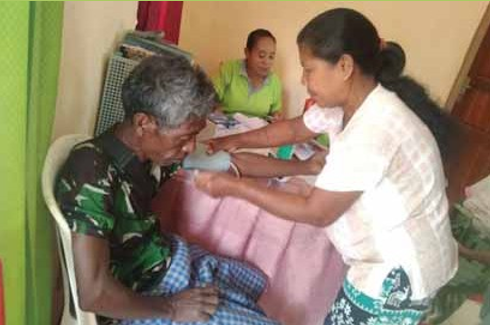


New Breakthrough to Solve Lost to Follow-Up
December 27, 2022


Maternal and Neonatal Emergency Management Workshop
December 28, 2022
Vaksinasi Covid-19 bagi Kelompok Rentan di DIY
The national vaccination program is the state’s effort to protect the public from the threat of the Covid-19 pandemic and to achieve community immunity or herd immunity. The Indonesian Ministry of Social Affairs emphasized its commitment to providing access to the Covid-19 vaccination to all Indonesian people, including persons with disabilities and other communities who are among the vulnerable groups affected by the Covid-19 pandemic. Therefore, the government asked all regional heads in Indonesia to immediately implement the mass Covid-19 vaccination program. Since the beginning, the Ministry of Health has targeted a total of 208,265,720 citizens to get the vaccine. According to the government, if 70% of the total number has been vaccinated, it is hoped that group immunity or herd immunity can be achieved. The need for vaccines of various types is said to be as many as 426,000,000 doses of vaccine, but as of August 2021, it was reported that Indonesia had only received 160,000,000 vaccine doses or around 30%. This means that the availability of vaccines has not been able to meet the needs and equal opportunities for all levels of society.
Justice and equality of access to the Covid-19 vaccine is indeed an important issue that concerns all countries in the world. The World Health Organization (WHO) itself has recommended that countries with limited access to vaccines prioritize several types of layers of society at an early stage. The scenario of vaccine administration according to WHO in the first stage is for health workers and the elderly, the second stage is for residents with comorbidities, sociodemographically vulnerable people, including vulnerable groups and teachers and school staff, while public workers are only entering the third stage along with pregnant women.
The vaccination policy run by the Indonesian government includes public officials as an initial target. They are people’s representatives, state officials, government employees, TNI, Polri, Satpol PP, village officials, BUMN, BUMD and firefighters. It is reported that the achievement of vaccination for public officials has reached 100% for two doses, on the other hand there are still many categories of people who are more priority, such as the elderly and vulnerable people who have not been able to access vaccine services. Vulnerable groups who have difficulty accessing vaccines include the disabled, transwomen, people with HIV and those who do not have an identification number.
Many vaccine acceleration programs have been implemented in DIY with the hope of reaching more people to get vaccines. However, in reality there are still many categories of vulnerable and marginalized people who have not been able to access vaccine services for various reasons, including lack of information, difficulties in accessing online registration and problems with KTP outside the region.
Seeing this fact, UPKM/CD Bethesda YAKKUM initiated a joint movement to fight for access to vaccines for vulnerable and marginalized groups. The first step taken by CD Bethesda was to collect data on vulnerable groups in collaboration with the Kebaya Foundation and the Victory Plus Foundation. Since the beginning of this collaboration, it has been agreed on the division of roles of each institution. The Kebaya Foundation is responsible for collecting data on the transgender group, the Victory Plus Foundation is collecting data on the PLWHA group, while CD Bethesda is advocating vaccine access for these vulnerable groups to several vaccine providers in DIY. With the involvement of many institutions, it is hoped that they can increase awareness in fighting for access to vaccines for vulnerable and marginalized groups.
From the data collection that was carried out in several stages, it was recorded that there were 426 people from the vulnerable and marginalized groups in DIY who had not been able to access vaccines due to various obstacles. This data is then submitted to several vaccine providers in DIY to be able to get access to vaccines along with other vulnerable groups. The process of vaccine advocacy for vulnerable and marginalized groups in DIY has experienced many dynamics in its journey, but in general all obstacles can eventually be overcome with synergy with many parties.


Vaksinasi Bagi Pengurus Yayasan Kebaya
The first vulnerable group vaccination activity was carried out on May 11, 2021 with a target of 20 transwomen, the elderly and administrators of the Kebaya Foundation. Vaccination is carried out by the Gedongtengen Health Center after going through several coordinations related to data collection and vaccine availability. Several stages of inspection were passed by all vaccine participants according to technical guidelines from the Ministry of Health. Starting from registration by showing an Identification Card (KTP), filling in the personal data of vaccine participants, checking blood pressure, and checking medical history. Doctors allow participants to be vaccinated if the assessment results indicate participants are in good health and meet the vaccine criteria. After the vaccine, participants must wait during the post-vaccine observation period to find out if there are any complaints they experience after the vaccine. Finally, participants are given a vaccine certificate for the second phase of the vaccination requirement. The challenge encountered in administering this first vaccine was related to the eligibility requirements to get the vaccine for PLWHA, namely the results of a CD4 test with a count above 200. With the imposition of these conditions, several participants failed to take the vaccine because they had not yet carried out a CD4 test.
Prune the Path, Get the Vaccine
Based on the experience from the implementation of the first vaccination, the advocacy process that was carried out was eventually developed not only to limit access to vaccines for vulnerable groups in DIY, but also to eliminate the eligibility requirements for vaccines in the form of a CD4 test. Advocacy for the eligibility requirements for this vaccine is not without basis, based on the Recommendations of the Association of Indonesian Internal Medicine Experts (PAPDI) regarding the administration of Covid-19 vaccination to patients with comorbid/comorbid diseases (Revised March 18, 2021) it states that “HIV patients with good clinical condition and taking medication Regular ARVs can be vaccinated against Covid-19.” This means that when people living with HIV/AIDS have good clinical conditions and are already taking ARV drugs regularly, then they are eligible to be given the vaccine regardless of their CD4 count. This advocacy process was finally successful, the vaccine eligibility requirement in the form of a CD4 count was finally no longer used in the administration of subsequent vaccines for PLWHA.
The next dynamic in the vaccine advocacy process for this vulnerable group is the requirement for a National Identity Number (NIK) that must be owned by participants who will access the vaccine. While the results of the data collection conducted by the Kebaya Foundation, there are 16 transwomen who, as of August 2021, do not have a NIK. Even though the Kebaya Foundation has been carrying out the advocacy process for the ownership of population documents for trans women in the last few years, it has not yielded optimal results. In fact, on March 26 2021, CD Bethesda together with the Kebaya Foundation and the YAKKUM Rehabilitation Center conducted an audience with the DIY Regional Secretariat Governance Bureau regarding the request for the issuance of NIK for transwomen and disabled groups in DIY as a condition for obtaining vaccines.
The results of the hearings were that the DIY Regional Secretariat Governance Bureau was willing to facilitate the issuance of NIK for vulnerable groups who needed and met the requirements (never had NIK, or had NIK before but had been deleted by Disdukcapil), after obtaining complete data from the institution that conducted it. accompaniment. But in reality, the process of issuing population documents is still experiencing problems. In view of these conditions and in order to optimize access to vaccines for vulnerable groups, including those who do not yet have a NIK, a series of advocacy activities is planned for August 2021.
On August 16, 2021 an online coordination meeting was held which was initiated by YAKKUM together with the Disaster Risk Reduction Forum (FPRB) and was attended by the DIY Governance Bureau, the DIY Health Service, the Regency/City Population and Civil Registry Services and agencies concerned with issues of vulnerable groups to discuss vaccine access for vulnerable groups without NIK. The results of the agreement from the meeting were: (1) Vulnerable groups who do not have a NIK can be given the vaccine first, then the participant data will be submitted to the Dukcapil Office for further processing (biometric crosscheck and form filling); (2) Implementation of vaccines for vulnerable groups without a NIK is coordinated by the DIY Health Office at the district/city Health Office; (3) After the NIK is obtained, the data is returned to the vaccine provider (Health Service) for recording and reporting in Protecting Care.
The next coordination meeting was held online on August 20 2021, this coordination was facilitated by the DIY Governance Bureau and was attended by the Director General of Population and Civil Registry of the Ministry of Home Affairs, Disdukcapil DIY, Regency/City Population and Civil Registry Services and vulnerable group monitoring agencies. The outcome of the meeting was direction and support from the Ministry of Home Affairs regarding easy access to NIK issuance for vulnerable groups as a condition for vaccines. This second meeting further strengthened the vaccine program network in DIY to immediately take several affirmative actions to facilitate access to vaccines for vulnerable groups.
Following up on a series of coordinations that have been carried out, data on vulnerable groups from the Kebaya Foundation and Victory Plus Foundation will then be coordinated to be included in the mass vaccine implementation carried out by IDEA in collaboration with the DIY Disaster Risk Reduction Forum (FPRB). A total of 86 transwomen and 137 people with HIV were proposed to get access to the vaccine which was held on 23 August 2021 at the Amongrogo Sports Hall. Of the 86 proposed transwomen, 16 of them do not yet have a NIK and can be vaccinated beforehand while the NIK issuance process is still being carried out by the Regency/City Population and Civil Registry Service. After the second vaccination of vulnerable groups was carried out, CD Bethesda in collaboration with the Victory Plus Foundation returned to collect data on vulnerable groups who had not received the vaccine. The result is data on 143 vulnerable groups proposed to take part in the mass vaccination conducted by the Jogja National Museum (JNM) on September 3, 2021.
The next vaccination activity for vulnerable groups was carried out on September 18, 2021 in collaboration with the Gedongtengen Health Center, which is one of the Community Health Centers that has quite high concern for vulnerable groups. Doctor Tri Kusumo Bawono, SE as the Head of the Gedongtengen Health Center said that vaccine services for vulnerable groups had been going well in collaboration with several institutions, the vaccination program was carried out without limiting Yogyakarta City KTPs and had been coordinated with the Yogyakarta City Health Office. Doctor Tri also appealed to vulnerable groups to be vaccinated immediately, not to be affected by hoaxes circulating, because vaccines are one of the efforts that can be made in preventing Covid-19. Based on data compiled by CD Bethesda, as many as 40 people from vulnerable groups were invited to take part in the vaccination activity, but only around 28 people attended to access the vaccine.


Vaksinasi bagi Kelompok Rentan di DIY
In several vaccinations for vulnerable groups, UPKM/CD Bethesda YAKKUM conducted interviews with a number of participants to obtain feedback on vaccination activities. The results of interviews about the vaccine flow, participants said that the flow of vaccine implementation ran quite smoothly, participants also felt comfortable while waiting in line because the waiting room was sufficient for them. In addition to the flow, the participants also conveyed the obstacles they have experienced in accessing vaccines, namely the lack of information about vaccine implementation, online registration difficulties and KTP rules outside DIY which so far have not been allowed to access vaccines by several vaccine providers.
The participants were grateful, they were finally able to access the vaccine and hoped that the government would ease the vaccine requirements so that they no longer look at certain KTPs in certain areas, and that registration could be carried out collectively through institutions that care for vulnerable groups as currently implemented, because they believed there were still many vulnerable groups who have not been able to access the vaccine.


Vaksinasi bagi Kelompok Rentan DIY
Lessons for All
The vaccine advocacy process carried out for vulnerable groups in DIY recorded several important lessons. The first is that it is the Government’s obligation not to leave vulnerable and marginalized groups in vaccination coverage. Second, the active involvement of vulnerable and marginalized groups in networking with stakeholders can increase social acceptance and concern for their existence, so that they also deserve the same rights. Three, accurate data on the existence of vulnerable and marginalized groups is one of the important points in the successful implementation of accelerated vaccination. The government can be more proactive in involving the role of civil society organizations in outreach and data collection for vulnerable and marginalized groups.


Proses Vaksinasi di Puskesmas Gedongtengen, Kota Yogyakarta
In the last few months of 2021, the Government continues to accelerate the national vaccination program, and it is starting to show results. The Centers for Disease Control and Prevention (CDC), the United States’ national public health agency, included Indonesia in Level 1, namely Low. With Indonesia’s entry into the level 1 or low category, it shows that the government’s hard work in accelerating vaccines has shown results and has been appreciated by international agents. Although on its official website the CDC continues to provide an appeal to people who wish to travel to Indonesia to have received the complete vaccine dose, in addition to other requirements in controlling the Covid-19 pandemic in Indonesia, namely wearing a mask and being at a distance of about 2 meters from other people.
The government also continues to ensure the public that the availability of vaccines remains safe, and the accelerated vaccination program throughout Indonesia continues to be carried out in the hope that it will run better and reach all levels of society and ensure that no vulnerable category of people is left behind. As of Thursday October 2021, more than 300 million doses of vaccine have arrived in Indonesia, both in the form of raw materials or in bulk. KPC-PEN data shows that the daily injection rate of the Covid-19 vaccine has touched 2 million per day. As of October 29, 2021, the total national injections reached 189.6 million consisting of 117.6 million Dose-1 (56.51% of the target) and 72 million Dose-2 (34.6% of the target).
The Indonesian government continues to intensify the Covid-19 Vaccination Program and increase vaccination achievements in these areas. In accordance with the President’s directives, vaccine stocks will be distributed as soon as possible to various regions in Indonesia, so that the vaccination program runs smoothly and faster. The Indonesian government has also implemented a mandatory vaccine policy for Indonesian people who want to do mobility or travel in an effort to suppress the spread of the Covid-19 virus. The advocacy efforts carried out by UPKM/CD Bethesda YAKKUM together with the network to fight for access to vaccines for vulnerable and marginal groups are certainly in line with the mandate of the Constitution of the Republic of Indonesia that every citizen has the same right to obtain health services. It is hoped that some of the good practices obtained in vaccine advocacy can become lessons for all parties on other issues. *(Ghanis Kristia).



